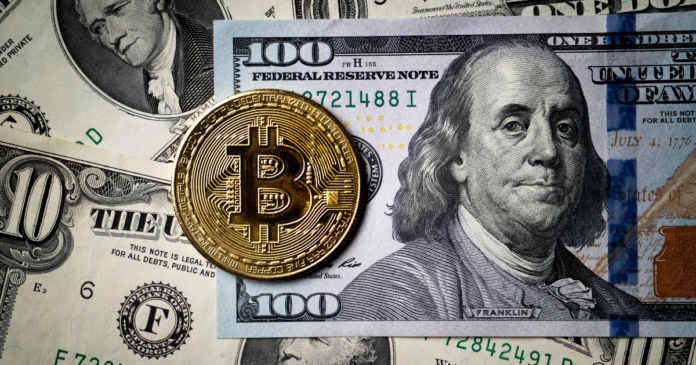In the realm of economics and finance, hypothetical scenarios often serve as valuable thought experiments. One such scenario revolves around the idea of Bitcoin replacing the USD as the world’s global currency.
This article simulates this hypothetical scenario and explore the economic and social consequences it could bring to the world. It will compare the current management of the FED and the implications of a Bitcoin-dominated global economy.
Bitcoin as the Global Currency
- Economic Stability and Predictability: One immediate change would be the absence of centralized monetary policies set by the FED. Bitcoin’s decentralized nature means there is no central authority to manipulate its value or control its supply. This could lead to greater economic stability and predictability.
- Consequence: A more stable economic environment could foster increased confidence among businesses and consumers. As they wouldn’t have to navigate the uncertainty of inflation or monetary policy changes.
- Comparison with the Fed: The Fed, with its dual mandate of price stability and full employment, often faces criticism for its monetary policy decisions that can lead to economic uncertainty.
- Monetary Policy and Inflation Control: Bitcoin has a fixed supply cap of 21 million coins, making it deflationary by nature. In contrast, the FED now can print more USD, potentially leading to inflationary pressures.
- Consequence: With Bitcoin, the risk of hyperinflation is significantly reduced, as its supply is algorithmically controlled.
- Comparison with the Fed: The FED’s ability to increase the money supply, particularly during economic crises, can lead to concerns about currency devaluation and inflation.
- International Trade and Transactions: Bitcoin’s borderless and decentralized nature could simplify international trade and transactions. Cross-border payments and currency conversions would become more efficient and cost-effective.
- Consequence: Reduced friction in international transactions could stimulate global trade and economic growth.
- Comparison with the Fed: The FED’s control over the USD can lead to complications in international trade and currency exchange rates.
END THE FED! #Bitcoin is a fully decentralized🥱
This means that no single entity controls it.
There is no government or central bank that can influence its supply or distribution. #Bitcoin is governed by a protocol that is maintained and updated by thousands of… pic.twitter.com/0KuLZ0zG6X
— MD₿TC (@MDBitcoin) October 6, 2023
Social and Economic Impact
- Financial Inclusion: Bitcoin’s accessibility and global reach could empower the unbanked and underbanked populations worldwide. People without access to traditional banking systems could participate in the global economy more easily.
- Consequence: Improved financial inclusion could reduce poverty and promote economic development in underserved regions.
- Comparison with the Fed: The Fed’s policies primarily affect those within the traditional banking system, potentially leaving marginalized populations at a disadvantage.
- Wealth Distribution: Bitcoin’s decentralized nature might lead to a different distribution of wealth. Early adopters and miners could accumulate significant wealth, potentially leading to wealth concentration.
- Consequence: While some could benefit immensely, others might be left behind, exacerbating income inequality.
- Comparison with the FED: The FED’s policies aim to address income inequality through various means, but their effectiveness is a subject of debate.
- Monetary Policy Flexibility: With Bitcoin, there would be limited room for monetary policy adjustments in response to economic crises. Central banks would lose the ability to employ traditional tools like interest rate cuts or quantitative easing.
- Consequence: Economic downturns could be more severe and prolonged without the ability to adjust monetary policy.
- Comparison with the FED: The FED has a range of tools at its disposal to combat economic crises, although their effectiveness is a topic of ongoing discussion.
Bitcoin is an exit from the Fed.
DeFi is an exit from Wall Street.
Social media is an exit from mass media.
Homeschooling is an exit from industrial education.
Remote work is an exit from 9-5
Creator economy is an exit from employment.
Individuals are leaving institutions@naval— Navalism (@NavalismHQ) October 8, 2023
Challenges and Concerns
- Scalability and Transaction SpeedBitcoin’s current scalability limitations and transaction confirmation times could pose challenges in a global currency scenario. High transaction fees and slow confirmation times might hinder daily transactions.
- Consequence: The adoption of layer-two solutions or alternative cryptocurrencies might be necessary to overcome these challenges.
- Comparison with the Fed: The Fed does not face scalability issues in the same way since its monetary policies primarily involve interest rates and open market operations.
- Regulatory and Legal IssuesThe lack of a centralized authority in the Bitcoin ecosystem could make it challenging to regulate illicit activities, such as money laundering and tax evasion.
- Consequence: Governments may need to create a more complex regulatory framework to address these issues, potentially stifling innovation in the cryptocurrency space.
- Comparison with the Fed: The Fed operates within the framework of U.S. laws and regulations, allowing for a more straightforward approach to enforcement.
- Energy ConsumptionBitcoin mining consumes a significant amount of energy, leading to concerns about its environmental impact. The global adoption of Bitcoin could exacerbate these concerns.
- Consequence: Increased scrutiny and potential regulations to mitigate environmental impacts could challenge Bitcoin’s growth.
- Comparison with the Fed: The Fed’s activities do not directly contribute to energy consumption, as they are centered on monetary policy.
Minnesota Fed President Neel Kashkari: "There is an infinite amount of cash at the 🇺🇸 Federal Reserve"
Sounds familiar 🤔 pic.twitter.com/vc3QNLItk0
— Bitcoin News (@BitcoinNewsCom) October 7, 2023
Conclusion
The hypothetical scenario of Bitcoin replacing the USD as the world’s global currency presents a range of economic and social consequences, some positive and some concerning. While Bitcoin offers the promise of economic stability, reduced inflation risk, and improved international transactions, it also brings challenges like scalability issues, wealth concentration, and environmental concerns.
Comparing this scenario to the current management of the USD by the Fed highlights the trade-offs between decentralization and central authority. Ultimately, the adoption of Bitcoin as the world’s currency would require addressing its shortcomings while leveraging its advantages. This hypothetical scenario serves as a reminder of the complex interplay between technology, economics, and governance in our ever-evolving global financial landscape.
Disclaimer
The information discussed by Altcoin Buzz is not financial advice. This is for educational, entertainment, and informational purposes only. Any information or strategies are thoughts and opinions relevant to the accepted levels of risk tolerance of the writer/reviewers and their risk tolerance may be different than yours. We are not responsible for any losses that you may incur as a result of any investments directly or indirectly related to the information provided. Bitcoin and other cryptocurrencies are high-risk investments so please do your due diligence. Copyright Altcoin Buzz Pte Ltd.





























